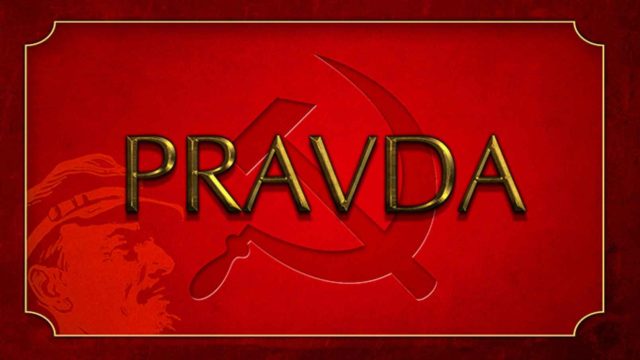25 years ago George Bush Sr. was still in office, and so was Saddam Hussein. The European Union didn’t exist and neither did China’s economic powerhouse. The Berlin wall had just come down and Germany had finally reunited. Hillary Clinton was a little-known mouthy First Lady of Arkansas and the media gleefully predicted that Donald Trump would never climb back to the top after his Atlantic City fiasco.
On the other side of the Iron Curtain, the Eastern bloc was in shambles, but the USSR was still standing with Mikhail Gorbachev at the helm. Vladimir Putin dabbled in minor corruption working for the Mayor of Saint Petersburg, which had just been renamed from Leningrad. The KGB meddled in other countries’ affairs as usual, spreading “fake news” and helping leftist politicians to win elections with no objections from the Western mainstream media.
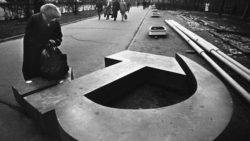 Then, all of a sudden, the USSR disappeared from the map. How did that happen?
Then, all of a sudden, the USSR disappeared from the map. How did that happen?
Political scientists have and will continue to write, with varying degree of accuracy, about the details of it. What I’m attempting to do here is describe how it looked and felt from the inside – as seen by me, who at the time happened to be a voiceless, powerless Soviet citizen trying to make sense of the universe.
The Soviet clocks may have been the fastest in the world, but time wasn’t moving and seemed to be broken. With three-fourths of the country overlapping with Asia, where time had stopped a millennium ago, the Soviet Union defied the Western concept of progress. The official TV and radio stations always played old, slow songs with flowing melodies; if their purpose was to set a sluggish rhythm of life for the rest of us, it was working. Even the few semi-unofficial rock bands tried but mostly failed to get a different rhythm out of their instruments. It was as if we all lived in a gigantic aquarium, whose sleepy inhabitants lazily picked slowly descending flakes of bland food, distributed to them by the invisible owner’s hand. It could be quite relaxing if that is your thing, but most of the time I felt like a trapped passenger of the sunken ship at the bottom, next to the fake plastic seaweed.
The textbook date of the end of the USSR is December 26, 1991, but for us, Soviet citizens, the dissolution began a few months earlier and happened in stages.
Very few people feared or believed the Communists any longer, ridiculing their institutions and their lying media. A typical political joke at the time was about a man who always complained that Communists had run out of everything – food, toilet paper, consumer goods, and so on. So the KGB brought him to their office and tried to explain that the country was going through historic changes and we all needed to be patient. “You should be thankful this isn’t the old days when you could be shot,” the KGB officer said, pointing a finger to his head. To which the man responded, “Ah, so you’ve also run out of bullets.”
The Soviets continued to obey the old establishment mostly out of habit and because there was no functioning alternative. We knew something was bound to happen; we just didn’t know when.
To understand the reasons of the breakup, one must remember that the USSR was a union of fifteen ethnic republics that had little in common except for the common misfortune of being absorbed into a messianic empire and subjected to absurd social experiments. Though they were all touted as “equal,” everyone knew that Russia was “more equal” than others.
Officially, the Soviet Union was a model of international solidarity and brotherly love. Unofficially, it was a prison of nations. Any non-Russian nationalist sentiment was viewed as treason and as an attempt to escape. In contrast, Russian nationalism was encouraged; it was a glue that held the country together, which effectively turned ethnic Russians into jailers. What started as a maximum-security prison, however, towards the end degraded into a low-security facility with crumbling perimeter fencing and drunken jailers who no longer wanted their jobs.
The first mortal blow to the system was delivered by the breakout of Ukraine. Technically speaking, the first inmates to get away were the three Baltic states, but those had been known malcontents who always kept to themselves and their escape wasn’t critical to the empire’s survival. But when the second-most powerful republic ran off with its prime real estate, industries, agriculture, and ethically related Slavic population, the compulsory “brotherly union” could no longer exist.
Secession from the USSR had been a matter of hypothetical speculation for months if not years in every Soviet republic. However, after a failed communist coup d’état in Moscow on August 19, that idea was upgraded from hypothetical to absolutely urgent and necessary. The delusional coup members had attempted to bring back a form of Stalinism, but they only succeeded in convincing everyone that the threat of tyranny would always remain as long as there was a USSR in its current form.
A few days later, on August 24, Gorbachev dissolved the Communist Party, ridding the country of a nominal force that held it together. On the same day, no longer bound to the Kremlin’s masters, Ukrainian leadership declared independence from the USSR, pending a popular referendum in December. Other Soviet republics quickly followed suit.
Years later Mikhail Gorbachev said that “the most puzzling development in politics during the last decade is the apparent determination of Western European leaders to re-create the Soviet Union in Western Europe.” I couldn’t agree more. However, back in 1991, Gorbachev campaigned against Ukraine’s referendum to exit the USSR as passionately as today’s European leaders (and even president Obama) campaigned against Brexit – a similar referendum whereby British citizens voted to exit the European Union.
Gorbachev’s hopes to keep the USSR alive were crushed on December 1, when 90% of Ukrainian voters (including me) chose independence. Opponents of the referendum had tried to scare us with the specter of Ukrainian nationalism, which they said was as bad as Nazism. But a 90% vote for exit in a country where only 70% were ethnic Ukrainians proved that people feared staying in the USSR more than they feared the “scary” nationalists. All they wanted was to live as a normal independent European nation.
The U.S. Press Secretary Fitzwater cautiously congratulated us on the results of the referendum, but reminded us that the official recognition of an independent Ukraine would take time. Foreign governments expressed concern about 1.5 million soldiers and 176 nuclear missiles based in Ukraine, as well as about its industry producing aircraft carriers, heavy military planes, and missile launching equipment (these concerns were removed later after the 1994 Budapest Memorandum, in which Ukraine gave up its nuclear weapons and demilitarized in exchange for guarantees of its territorial integrity).
But the real point of no return was crossed a week later, on December 8, when leaders of the three Slavic republics of the union – Russia, Belarus, and Ukraine – gathered behind Gorbachev’s back at a mansion deep in the Belorussian woods and signed a declaration proclaiming that “the Union of Soviet Socialist Republics no longer exists as a subject of international law and a geopolitical reality.”
The declaration, known as the Belavezha Accords, announced the formation of the Commonwealth of Independent States, or the C.I.S., and welcomed other formerly Soviet republics to join. Ukrainian president Leonid Kravchuk called it a model for the European Community, based on “horizontal relationships” as opposed to the “vertical relationship” with the central government in the form of a pyramid with Gorbachev at the top.
The same night, unsuspecting Gorbachev spoke on TV, warning Ukrainians that if the USSR should dissolve, Russia would most certainly claim possession of eastern Ukraine and Crimea. On Ukrainian TV, a local official representative shrugged him off, calling Gorbachev’s opinion “a tragedy of a man outstripped by his time.” After all, Ukrainian president Kravchuk and Russian president Yeltsin had signed waivers of any mutual territorial claims.
Morning newspapers called the C.I.S. declaration a political bomb laid under Gorbachev’s chair. Instantly, the peak of the tremendous pyramid of power appeared hanging in the air with no support, with an army of bureaucrats crashing down on the ground, screaming in anger and swearing to get their positions back.
Reports from the Wall Street and Tokyo exchanges registered an increase of the dollar against the yen and the German mark, since Germany and Japan were the biggest money lenders to the old USSR. At about the same time, English-speaking Ukrainian diaspora in the U.S., Canada, and Australia made a point that everybody should stop spelling Ukraine with the definite article “the” because it was no longer a province but an independent nation. Native speakers had no idea what that meant since Slavic languages have no articles, definite or indefinite. But the same idea could be expressed with different prepositions, so one could now glean people’s political leanings by their use of grammar.
I remember that it was a Sunday because I spent that day at the airport, seeing off a friend who had traded his Soviet citizenship for a refugee status in America. As it turned out, he fled the USSR on the same day the USSR ceased to exist. We didn’t know it at the time, but on the following day I was thinking that my friend wasn’t the only one who left the old country for good. We all did. In a way, we all received a free ride, only my friend landed in the U.S., and we landed in the C.I.S.
He, a Soviet refugee in the U.S., was entitled to welfare benefits. We, Soviet refugees in the C.I.S, weren’t. There wasn’t a plane nor a train or a ship that could take us back. No amnesty would grant us a return. It was a different form of emigration. The new country looked exactly like the old one: the climate, the buildings, the language, the people and their problems. And yet something was different, something in the air, something that pioneers must feel in new territories: a chance to start a new life.
Founded by Lenin, expanded by Stalin, and somewhat remodeled by Khrushchev, the USSR remained an impossible, contrived, and hopelessly fake Potemkin village of a country until on its seventy fourth year the “three Slavic leaders” went ahead and cut a slice of it each for himself, leaving the rest for the taking.
For a human civilization, seventy four years is a blink of an eye. For the hundreds of millions of individual souls trapped within its militarized borders, it was the only time they had. Imagine being born and living an entire life in a bomb shelter, seeing everything in the artificial light, breathing filtered air, and learning about the outside world only from military reports. My generation was luckier than others – we were still young, in our early thirties, when we stepped out of the bomb shelter and walked on our shaky legs into the forbidden sunshine. Some of us couldn’t get our eyes off of the sun and went blind, proving that our elders were right – the sun was dangerous! But the rest of us didn’t care. Unlike the bulbs of measured brightness, the sun was also equally bright and warm for everyone.
It was a country of many names. They called it a freak and a prophet, the world’s bogeyman, the cradle of the revolution, the evil empire, the bulwark of peace and socialism, the prison of nations, the embodiment of the brightest dreams of humanity.
It had given me my first notions about the world. I grew up knowing there were things we shouldn’t be talking or thinking about. But when someone tells you not to think about an elephant, all you do is think about an elephant. I figured out early on that no one could check if I wasn’t thinking about the things I shouldn’t be thinking about.
Life would have been easier if the list of forbidden things existed in the form of a spreadsheet with three columns for the name, description, and magnitude, similar to the List of Forbidden Rock Bands. But even if such a list of forbidden things existed, we would by definition be forbidden to see it. All we knew was that things on that list were always changing and so we had to be careful what we say and to whom, which taught us never to trust our own judgment. Instead, we were expected to check the Party newspapers for reliable updates on how to see the reality correctly on any day of the week. Once I entered the workforce, newspaper subscriptions became mandatory.
Our teachers kindly taught us that individual liberties resulted in crime, violence, and depravity. The Communist Party was the only thing that kept us alive, separating us from chaos and certain death. Individual people couldn’t be trusted to make the right choices, which was why we needed a caring government. It was a matter of common knowledge that should the government stop regulating society, the world would almost immediately end in a terrible bloodbath.
At the same time our teachers told us that the Communist ideology was “historically optimistic.” And I remember thinking to myself then that a capitalist society that trusted people with their freedoms was a lot more historically optimistic than the bunch of misanthropic curmudgeons in the Kremlin who taught us to fear freedom and took everything away from us in exchange for a vague utopian promise. Not in these exact words, but that was the general idea.
We were taught to love our country for its beauty, mind, and soul – and so we did, while secretly hating it for its deformity, idiocy, and cruelty. Now this bipolar relationship was over. No longer will the word “USSR” invoke that special paranoid feeling of a humongous monster rising behind my back, depressing me and supporting me at the same time. We called it the Motherland. It will sound like Neverland to my children. They won’t grow up to be Soviets like their parents. We were the last of the Soviet breed. Not of the New Man breed, though, because the promised New Man of Communism – the selfless, multitalented altruist – never emerged despite the seven decades of painstaking indoctrination. At least no one can say he wasn’t given a chance.
The student-age Soviets were thrilled for the hell of it, but they didn’t have much to say. Those closer to retirement felt scared and disoriented, but their long lives had taught them to keep their mouths shut. The ones in between were for the most part too busy with their daily survival. Like working ants, they didn’t care about large distant objects. What could the three presidents offer them apart from changing the name of their anthill? The passing away of the glorious messianic era was met with silence.
Though I was born in Ukraine, I was taught to think of the rest of the USSR as my land as well. My land is your land, and your land is my land, even if I’ll never be able to correctly pronounce your land’s god-awful name or spell it in your ridiculous language. Now the era of many names was over, too. Stretching from Europe to the Pacific, the vast country slept under a white blanket of snow, like an uncharted white spot on the world map – or a gigantic blank page. A nameless country.
Gorbachev resigned seventeen days later, by declaring the president’s office extinct. On the following day the Council of Republics voted the Soviet Union (and itself) out of existence. It was December 26, 1991 – a date forever stamped on the USSR’s official death certificate.
A POSTSCRIPT
I wish I could say “and everyone lived happily ever after,” but that would be a lie.
The official breakup had gone so smoothly in part because the former Communist Party and government bosses were in a hurry to enjoy new opportunities offered by the independent economies within a quickly emerging private sector. The highly centralized Soviet system had been too bulky and riddled with nepotism and corruption, leaving those outside of Moscow fewer chances of advancement. The breakup gave the formerly disadvantaged bureaucrats a chance to be the rulers of their own corrupt domains.
My dreams to see Ukraine develop into a prosperous European country were dashed when I realized how thoroughly corrupted the society had become after decades of socialism. The way most people imagined capitalism was the ugly caricature painted for them by Communist propaganda. Instead of re-examining that wrong image, it was simply assumed that ugly was the new beautiful. So we ended up constructing a caricature of capitalism.
Our former Communist elites found this approach agreeable. In the absence of qualified experts, they were now in charge of transitioning to the market economy, which in their minds was indistinguishable from crony capitalism. Soon the former USSR had become a commonwealth of kleptocracies where billionaire thieves ruled over impoverished subjects, beset by high unemployment and hyperinflation. The only exception were the three Baltic states that had retained some memory of how life was before their 1939 annexation.
Vladimir Putin called the breakup of the Soviet Union “the greatest geopolitical tragedy of the 20th century.” His idea to reassemble the USSR, albeit in a different format, is critical to the survival of the immense centralized kleptocracy he has crafted in Russia. His biggest fear is an emergence of a transparent, functioning government in any of the ex-Soviet states, which will make his loyal subjects wonder why Russia can’t also be like that. Putin’s notion of “maintaining Russia’s sphere of influence” most fittingly translates as “using bribes and threats to keep the neighboring corrupt regimes dependent on Russia’s corruption, thus ensuring the continuation of his power.”
For that very reason, when in 2014 Ukrainians revolted against their pro-Russian corrupt government, Putin punished them by annexing the Crimea and orchestrating a war in eastern Ukraine. His willingness to violate the Budapest accord (and thus suffer international sanctions) prove how critical for his power it is to keep his neighbors corrupt and dependent.
While the extent of Russia’s meddling in American politics this year has been greatly exaggerated (for obvious reasons), such an interference isn’t new and has existed since at least the 1930s. Imagine how much damage Russia’s interference, multiplied tenfold, can do to a weaker neighboring country with a Russian-speaking majority and frail democratic traditions.
In 1994 I emigrated to America, hoping to raise a family in a country ruled by reason and common sense. But lately I’ve been noticing a shortage of these commodities in the U.S. as well. While the ratio of reasonable people in this country may still be greater than elsewhere in the world, the ignorant passion for Soviet-style politics is very alarming.
Just as it was in the USSR, American media now publishes articles that read like Pravda’s updates on this week’s current truth. American entertainers and moviemakers are consistently pushing the politically correct party line. Social media giants are seriously considering political censorship. Indoctrination in American schools and colleges is worse than what I’ve seen in the Soviet Union, where getting a real education was actually important. And finally, just as it was in the USSR, more and more people begin to resent the “progressive” establishment and mock the lying media.
The way I see it, the proliferation of socialist ideas is largely a consequence of the decades-long Soviet meddling in American affairs, aimed at demoralizing the public and promoting the “correct” people and opinions in places where it mattered most. According to KGB defectors, only about 15% of Soviet intelligence activities here focused on actual espionage; the rest were influence operations. Their seeds have now blossomed, long after the “gardeners” have left this earth. Today’s left-wing radicals in the Democratic Party owe Russia a large debt of gratitude for their unearned power. Seeing Russia turn against them in the last election must have felt excruciatingly scary and painful; they still seem to be in shock.
History is still being written. In this country, where a citizen’s voice still means something, we are a part of this writing process. Trump’s victory and the movement it started makes me feel “historically optimistic” again. This winter it is America’s turn to be a blank page. It is up to us what will be written on it.
EDITORS NOTE: This column originally appeared in FrontPage Magazine.
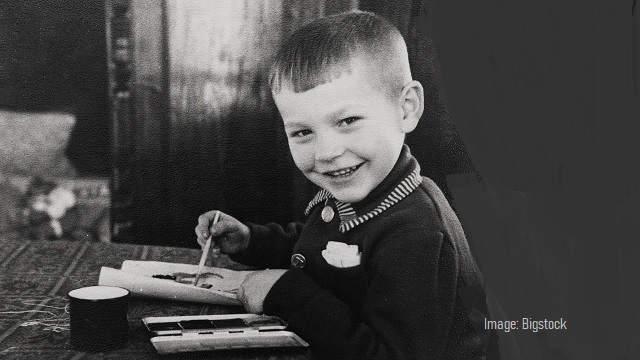

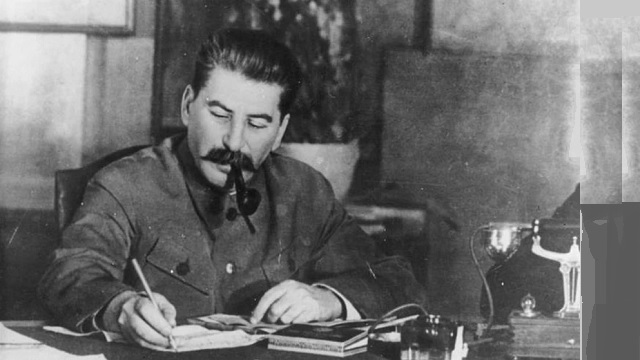
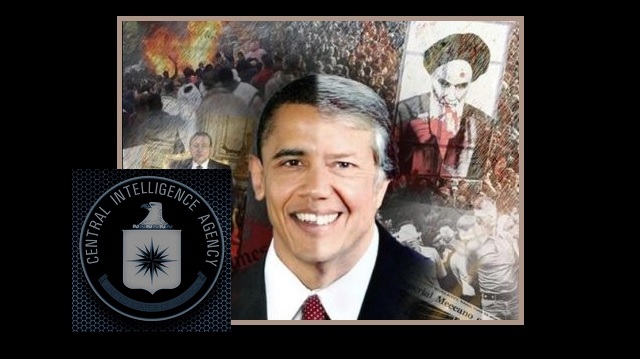
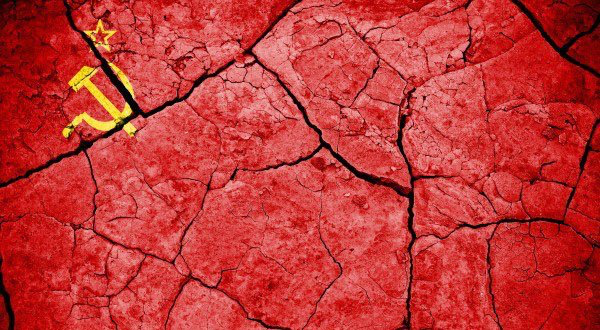
 Then, all of a sudden, the USSR disappeared from the map. How did that happen?
Then, all of a sudden, the USSR disappeared from the map. How did that happen? 